Restaurateur Views on World Food Safety Day
Theme for this year is "Food Standards Save Lives". Let's see what are views on the theme from different industry experts and chef's. Rajat Agrawal CEO, Barista Foodborne diseases affect 1 in 10 people worldwide each year, and

Theme for this year is “Food Standards Save Lives”. Let’s see what are views on the theme from different industry experts and chef’s.

Rajat Agrawal
CEO, Barista
Foodborne diseases affect 1 in 10 people worldwide each year, and food standards help us to ensure what we eat is safe. Food standards play a crucial role in safeguarding public health and saving lives. These standards encompass various aspects of food production, processing, and handling, ensuring that the food people consume is safe, nutritious, and free from contaminants.
We at Barista Coffee Company Limited, follow strict guidelines from proper food storage to delivering it to the consumers, reducing the risk of contamination and food spoilage. Additionally, we promote transparency and accurate labeling, enabling consumers to make informed choices about the products they purchase. By enforcing and adhering to robust food standards, we ensure health and safety of our guests.
Chef.Noah Barnes
Co-Founder & Chef at Miss Margarita by Arriba.
Ensuring food standards not only guarantees the quality and safety of the food we consume but also plays a vital role in safeguarding lives. Strict adherence to food standards helps prevent a multitude of health risks and potential outbreaks, ultimately saving lives. These standards encompass various aspects such as the sourcing, handling, processing, and storage of food products. By implementing rigorous guidelines, governments, and regulatory bodies aim to eliminate contaminants, pathogens, and harmful substances from the food supply chain. These measures significantly reduce the chances of foodborne illnesses, such as bacterial infections, parasites, and toxic chemical contamination. Furthermore, proper labeling and accurate information regarding ingredients and allergens aid individuals in making informed choices, especially those with specific dietary requirements or allergies. Additionally, adherence to food safety protocols ensures the prevention of cross-contamination, maintaining hygiene, and promoting proper food handling practices across all stages of production, distribution, and consumption. By upholding food standards, we can foster a healthier society, mitigating the risks associated with foodborne diseases and preserving countless lives.


Amit Bhatia
Director Culinary, The Sassy Spoon
Food standards play a critical role in safeguarding public health by ensuring that the food we consume is safe, nutritious, and of high quality. These standards encompass various regulations, guidelines, and practices implemented by governments, international organizations, and food industries to maintain the integrity of our food supply chain.
Preventing Foodborne Illnesses: Foodborne illnesses are a global concern, affecting millions of people every year. Food standards establish strict protocols for food handling, processing, and storage, minimizing the risk of contamination and the spread of harmful pathogens. Through inspections, testing, and traceability measures, these standards help identify and mitigate potential hazards, reducing the incidence of foodborne diseases. By preventing illnesses such as salmonella, E. coli, and listeria, food standards undoubtedly save lives.
Ensuring Nutritional Adequacy: Food standards not only focus on safety but also address the nutritional content of food products. They promote accurate labelling, specifying ingredients, nutritional values, and potential allergens. These standards guide food manufacturers in fortifying essential nutrients, reducing harmful additives, and adhering to appropriate portion sizes. By ensuring that consumers have access to accurate and reliable information, food standards empower individuals to make informed dietary choices, leading to improved health outcomes and reduced risks of chronic diseases.
Allergen Management: Food allergies can be life-threatening for those affected. Food standards establish rigorous protocols for managing allergens, including proper labelling and segregation of allergenic ingredients during manufacturing and processing. By mandating the declaration of
potential allergens, food standards protect individuals with specific dietary requirements, reducing the chances of accidental exposure and severe allergic reactions.
Chef Ram Bahadur Budhathoki,
Head Chef, Chowman Chain of Restaurants
We follow a very stringent policy when it comes to maintaining the quality. Few raw materials are imported while the rest undergo inspection as per FSSAI standard certified use. We further check the nutritional value of each through the labelling which posits a big factor. Furthermore, we have mandated quarterly lab test of cooked/raw items, drinking water and high-risk food like baos, momo, salads. We’ve further implemented separately labelled chopping boards for veg, seafood & red meat to prevent cross contamination. Cleaning and sanitization are two very significant factors and we’ve appointed FSS or Food Safety Supervisor to do the minute work pertaining to quality check for serving fresh food to our customer by maintaining logbooks on a regular basis.
The entire hygiene cycle is carefully executed and monitored chronologically as Receiving, Preservation, Cleaning & Sanitization, Optimum Cooking Technic & lastly Waste Management Technic. Although Covid-19 is no more prevalent, yet it has garnered a huge beneficial means for hygiene purpose. Thorough sanitization, cleanliness, grooming is a must, along with regular cleaning of every-day touch points. For Waste Management Technic one significant inclusion we have recently able to implement is the RUCO or Repurpose of Used Cooking Oil methodology which enables conversion of cooked oil into biofuel via RUCO agents. This is a leap for us as a leading Chinese food brand in Asia to curb harmful health hazards and after-math of consuming used cooking oil after a certain number of uses


Chef ViveQ Pawar
Culinary Head, Roxie
Food standards are a set of guidelines established by regulatory agencies to ensure the safety and quality of food products. These standards outline the criteria that must be responsibly met by chefs and to minimize the risk of contamination and prevent foodborne illnesses. While some may see food standards as bureaucratic red tape, they are in fact crucial for ensuring public health and safety.
The importance of food standards cannot be overstated. Without them, foodborne illnesses would be much more common and potentially deadly. According to the World Health Organization (WHO), unsafe food causes an estimated 600 million cases of foodborne illnesses and 420,000 deaths worldwide each year.
Food standards help prevent foodborne illnesses by establishing guidelines for food production, processing, and preparation. These standards cover everything from the use of pesticides and other chemicals in farming to the hygiene practices of food handlers.
In addition to preventing foodborne illnesses, food standards also play an important role in ensuring the nutritional quality of food products.
Food standards also protect vulnerable populations, such as children, the elderly, and those with weakened immune systems. These groups are more susceptible to foodborne illnesses and are at a higher risk of serious complications from such illnesses. In conclusion, food standards are critical for ensuring the safety and quality of our food supply. They help prevent foodborne illnesses, protect vulnerable populations, and promote good nutrition. While complying with food standards may require additional effort and expense for food producers and processors, the benefits in terms of public health and safety are immeasurable. By adhering to food standards, we can all enjoy the peace of mind that comes with knowing that the food we eat is safe, nutritious, and of the highest quality.
Parikshit Joshi
Executive Chef-Someplace Else, Badra Kurla Complex
We are what we eat, So it is very important that what we eat is right and safe.
Food safety standards are guidelines drawn by FSSAI to prevent food-related hazards and deaths. Foodborne illnesses are very common in our country, In fact, Indian food is infamous for causing food poisoning among foreign tourists. I think we need to change this perception. This can only change when we take food safety standards seriously.
So here are some pointers which are essential to follow for food safety:
This is a cycle and it starts from producing to consuming
1) Farmers should be using the right amount of fertilizers to get quality produce.
2) Care should be taken while packaging too.
3) Proper transporting vans should be deployed for specific foods.
4) Poultry culture should be improved by setting the right standards.
5) People should check packaging and expiry dates while purchasing.
6) Perishable foods are to be stored at the right temperature and should be consumed within 2 days.
7) Proper cooking methods and storing methods should be used at homes and restaurants for safe food.
8) Food handlers in commercial restaurants should be properly trained for FIFO, HACCP, and other technical guidelines to always produce and deliver safe food.
9) Personal hygiene at commercial places to be maintained.
10) 3 important contaminants to look out for in kitchen by food handlers at all catering establishments Biological, Chemical, and Physical WHO and food-related organizations globally and in India like FSSAI should work at the grass root level to minimize the risk and hazards caused due to unsafe food.
11) FSSAI should strictly do a check before giving licenses to food joints.
12) All these measures will surely reduce the hazards and illnesses caused by food.
“Safe Food Great Food” or “Healthy Food Abhiyan” should be planned and executed by local bodies at the grass root level.


Chef Haseen Qureshi
Taftoon, BKC
Food standards at Taftoon Restaurant are the heart and soul of our culinary philosophy. We believe that every dish we serve is a testament to our unwavering commitment to excellence. We meticulously select the finest ingredients, ensuring their freshness and quality. Our team of passionate chefs pour their creativity and expertise into every recipe, crafting flavours that transcend boundaries and ignite the senses. At Taftoon, we don’t just serve meals; we curate unforgettable culinary experiences. And our food standards are a reflection of our devotion to delighting taste buds, and with every bite, we strive to create memories that linger long after the last morsel is savoured.
The 2023 World Food Safety Day Slogan – Food safety is everyone’s business, is a clear message. No matter who you are or what you do, you play an important role in making sure food is safe to eat.
There are things you can and must do when you buy, store, cook and eat food to make sure that food stays safe. Science is key to sound food safety management, monitoring temperatures and implementing systems (HACCP), safety standards required by national authorities and other data collection efforts followed by its assessment ensures that we have the information to develop an environment needed to maintain safe food despite changes to the production environment, processing technology and consumer habits.
The safety of food is affected by the health of animals, plants and the environment within which it is produced. Adopting a holistic One Health approach to food safety will deliver a better food safety system.
Chef Ganesh
Amazonia, BKC
You Are What You Eat’ means that it is important to eat good and healthy food in order to be healthy and fit
Food is essential to life; hence food safety is a basic human right. Billions of people in the world are at risk of unsafe food. Many millions become sick while hundreds of thousand die yearly. The food chain starts from farm to fork/plate while challenges include microbial, chemical, personal and environmental hygiene
The theme, “Food standards save lives” is aimed at recognizing the importance of food standards across the world in keeping consumers safe, and in underpinning an equitable trade in food.
Food safety is a basic human right
Billions of people in the world are at risk of unsafe food. Many millions become sick while hundreds of thousands die every year because they consume unsafe food. Therefore, safe food saves lives. Safe food enhances individual and population health. Safe food improves economic growth of the region where food safety is practiced and enhanced.
Foodborne diseases affect 1 in 10 people worldwide each year, and food standards help us to ensure what we eat is safe
The safe and nutritious food is key to sustaining life and promoting good health. Unsafe food containing harmful bacteria, viruses, parasites or chemical substances causes more than 200 diseases, ranging from diarrhea to cancers.
Why is standardization of food important?
Food safety standards are essentially process standards whose aim is to improve the safety of the end products.
10 Golden Rules” for Safe Food Preparation
1. Choose foods processed for safety
2. Cook food thoroughly
3. Eat cooked foods immediately
4. Store cooked foods carefully
5. Reheat cooked foods thoroughly
6. Avoid contact between raw foods and cooked foods
7. Wash hands repeatedly
8. Keep all kitchen surfaces meticulously clean
9. Protect foods from insects, rodents, and other animal
10. Use safe water
So in short we can say, Safe food provides basic human necessity. It supports national economy, trade and tourism, contributes to nutrition security, and underpins sustainable development.
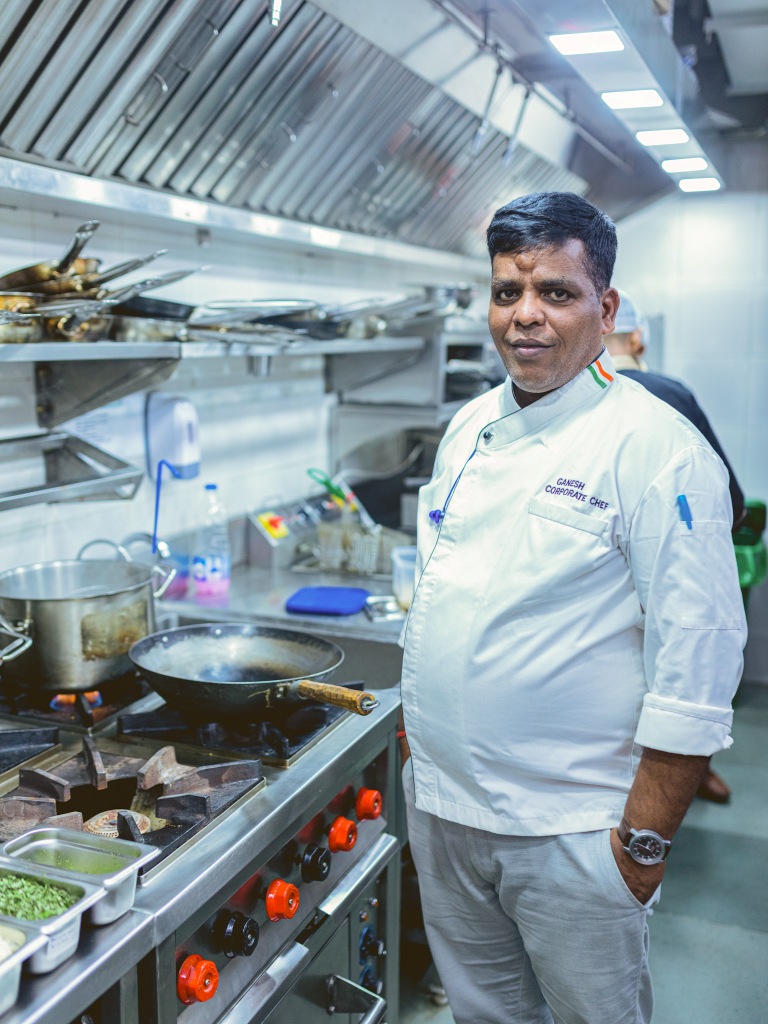

Chef Santosh Nayak
All Saints
At All Saints, we prioritize food safety and adhere to stringent standards to protect the well-being of our customers. Here are the key measures we implement:
From the very beginning, we focus on sourcing only the finest quality raw ingredients. Our produce undergoes thorough washing using diluted chlorine, and we store it in color-coded sections of our walk-in freezer to carefully monitor its shelf life.
In our kitchen, we maintain specific cooking temperatures to ensure that our food remains fresh, delicious, and of the highest quality. We also prioritize regular sanitization and cleaning of common surfaces and kitchen equipment to prevent any cross-contamination risks.
To promote healthier options, we consciously avoid sauces and preparations high in sodium and foods with excessive preservatives. Instead, we procure fresh ingredients and vegetables, allowing us to offer flavorful and nourishing dishes.
We embrace the use of seasonal products, as it not only supports local suppliers but also enables our culinary team to showcase their creativity in crafting unique and exciting dishes.
Continuous training is provided to our kitchen staff to enhance their knowledge of food hygiene practices and various aspects of food safety. This ensures that our team remains up to date with the latest industry standards and best practices.
By prioritizing food safety through these practices and initiatives, we are committed to providing our guests with a dining experience that not only delights their taste buds but also safeguards their health.
At All Saints, we firmly believe that adhering to food safety standards is essential to safeguard lives and create a memorable and worry-free dining experience for all our valued patrons.
We implement frequent sanitization of common surfaces to maintain a clean and hygienic environment. Additionally, we utilize modern UV sanitization machines, further enhancing the effectiveness of our sanitization efforts.
When it comes to serving food, we take extra precautions to minimize contact and promote safety. From the moment it leaves the wok until it reaches the final customer, we strive to maintain a contactless process. Our dedicated servers ensure that the food is handled with care and delivered to you without unnecessary contact.
By adopting these measures, we prioritize the well-being of our customers and staff alike. We believe that by upholding high food standards, we contribute to the preservation of health and safety in our dining establishment.
Chef Hiren Mistry
Millo
In today’s world where a lot of food consumed is processed, packaged and synthetic at that time food safety helps consumers and people to form new habits which are makes them more aware. Ways to store food and prepare is the most important part to be kept in mind while consuming food in restaurants. Proper temperatures to be maintained in fridges so that there is less shock on food as per temperatures are concerned. Using more natural and authentic ingredients help them to restore the nutrients. In our restaurants thorough temperature check, food markings with date of production and its expiry are marked via colors. Storage temperatures are given a lot of importance as that where the sensitive part is.
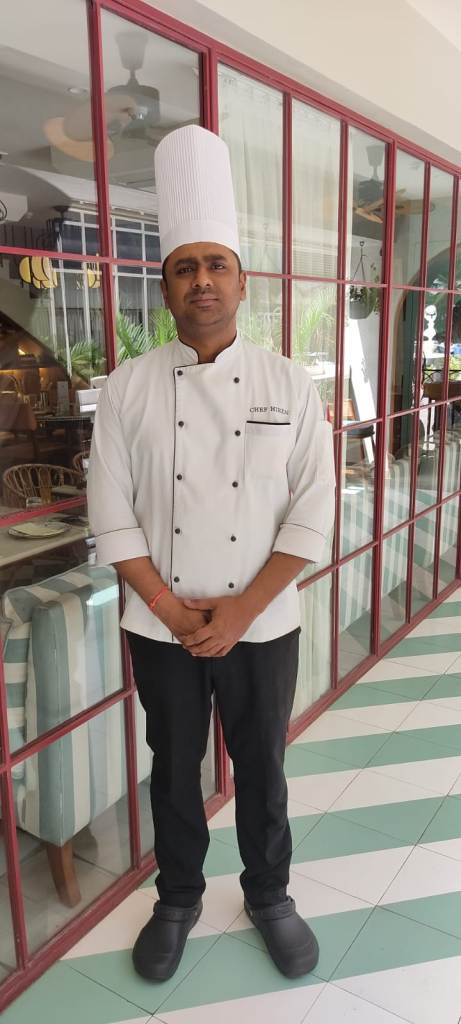

Chef Agnibh Mudi
one8 Commune, Juhu
World Food Safety Day is an annual global event that aims to increase awareness about effective measures that F&B and hospitality brands can take to mitigate the risks associated with food-borne illnesses. This significant day highlights the crucial role of food standards in safeguarding lives across the world. It emphasizes that food safety encompasses not only cooking and production but also encompasses procurement, supply chain management, manufacturing processes, and establishment practices.
The core principle of this initiative revolves around the adoption and maintenance of Standard Operating Procedures (SOPs) that foster a robust food safety culture. Numerous factors contribute to the safety of food and food products, including dynamic food cycles, local sourcing, and the impact of climate change. By addressing these factors, World Food Safety Day seeks to promote safe and healthy food practices on a global scale.
Chef Nirvaan Thacker
Za’atar
When it comes to food safety we follow 2 major things at Za’atar. 1. Thoroughly washing any produce that comes into the kitchen to prevent debris or unwanted organic matter in the food. 2. Storage of meats – both raw and cooked at appropriate temperatures (and not using a traditional shawarma machine) in order to prevent diseases from foods sitting in the temperature danger zone


Amit Bhatia
Director Culinary, House of Mandarin
Food standards are a fundamental pillar of public health and safety. By preventing foodborne illnesses, ensuring nutritional adequacy, managing allergens, and promoting food quality and authenticity, these standards save lives. They form the basis for a robust food safety infrastructure, benefiting consumers, businesses, and the economy at large. Governments, regulatory bodies, and industry stakeholders must continue to prioritize and strengthen food standards to safeguard public health, foster consumer confidence, and create a healthier and safer food environment for all.
Promoting Food Quality and Authenticity: Food standards also address issues related to food quality and authenticity. They set guidelines to ensure that food products are not adulterated, mislabelled, or misrepresented. These standards combat food fraud, preventing the distribution of counterfeit or substandard goods that may pose health risks. By guaranteeing the quality and authenticity of food products, standards maintain consumer trust, leading to a healthier and more transparent food industry.
Chef Vadim Shin
Yazu
When a chef prepares a meal, they take several precautions and safety measures to ensure that the food is safe to eat and that accidents are avoided. Let’s explore some of these measures in a simple and concise manner.
First and foremost, chefs focus on personal hygiene. They wash their hands with soap and warm water before handling any food. This helps to get rid of germs and bacteria that can make people sick.
Chefs also keep their work areas clean. They regularly clean and sanitize their cutting boards, knives, and countertops. By doing this, they prevent the spread of harmful bacteria from one food item to another.
To prevent cross-contamination, chefs handle different types of foods separately. For example, they use separate cutting boards and utensils for raw meat, poultry, seafood, and vegetables. This reduces the risk of bacteria from raw foods contaminating cooked foods.
Temperature control is crucial in food preparation. Chefs refrigerate perishable ingredients promptly to keep them fresh. They also cook foods to the right internal temperature to kill any harmful bacteria that might be present. It’s important to cook meat, poultry, and seafood thoroughly to ensure they are safe to eat.
Proper storage is another key precaution. Chefs label and store ingredients correctly. This helps them keep track of what they have and when it was prepared. They also store perishable items in appropriate containers and refrigeration units to maintain their freshness and prevent spoilage.
Chefs are aware of common food allergens and take steps to prevent cross-contamination. They may use separate utensils or designated areas for preparing allergenic ingredients. By doing so, they reduce the risk of allergic reactions in people who are sensitive to certain foods.
In the kitchen, chefs pay attention to fire and kitchen safety. They keep equipment in good condition, avoid leaving flammable materials near heat sources, and know where fire extinguishers are located. They also keep their workspace clean and organized to prevent accidents and ensure a safe working environment.
Using proper cooking techniques is crucial. Chefs make sure that food is cooked thoroughly and evenly. This helps to kill bacteria and ensure that the meal is safe to eat. They may use food
thermometers to check the internal temperature of cooked foods to ensure they are cooked to the right level.
Chefs continue to learn and stay updated on food safety practices. They attend training sessions and certifications to stay informed about potential hazards and regulations. This ongoing education helps them maintain a safe cooking environment and protect the health of their customers.
By following these precautions and safety measures, chefs ensure that the meals they prepare are delicious and safe to eat. They prioritize cleanliness, proper cooking techniques, and awareness of potential allergens and hazards. These practices help to maintain high standards of food safety and protect the well-being of everyone enjoying a meal prepared by a chef.
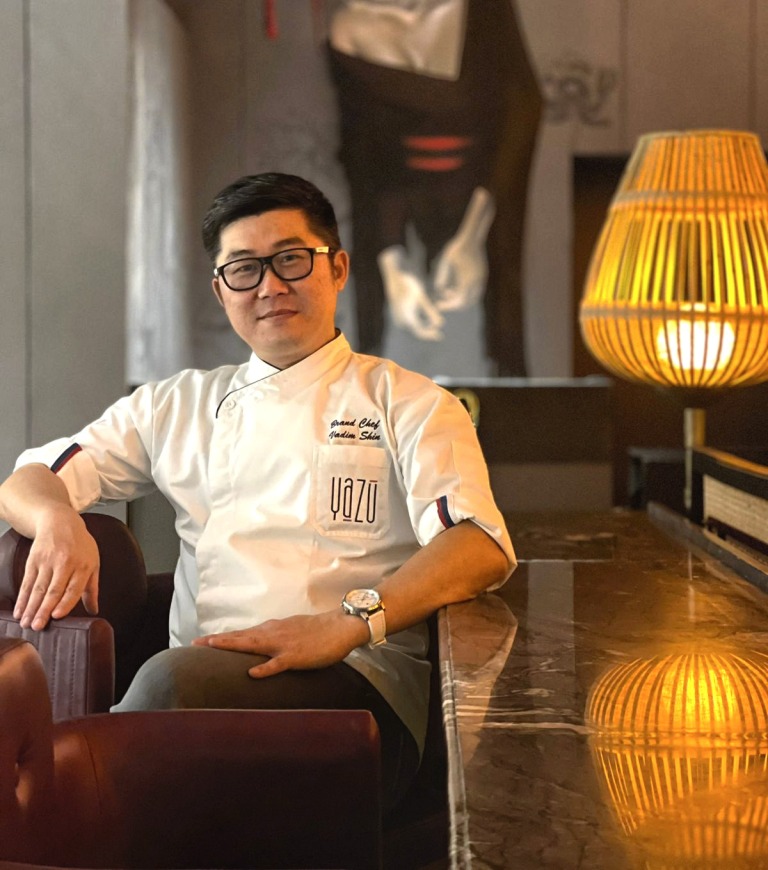
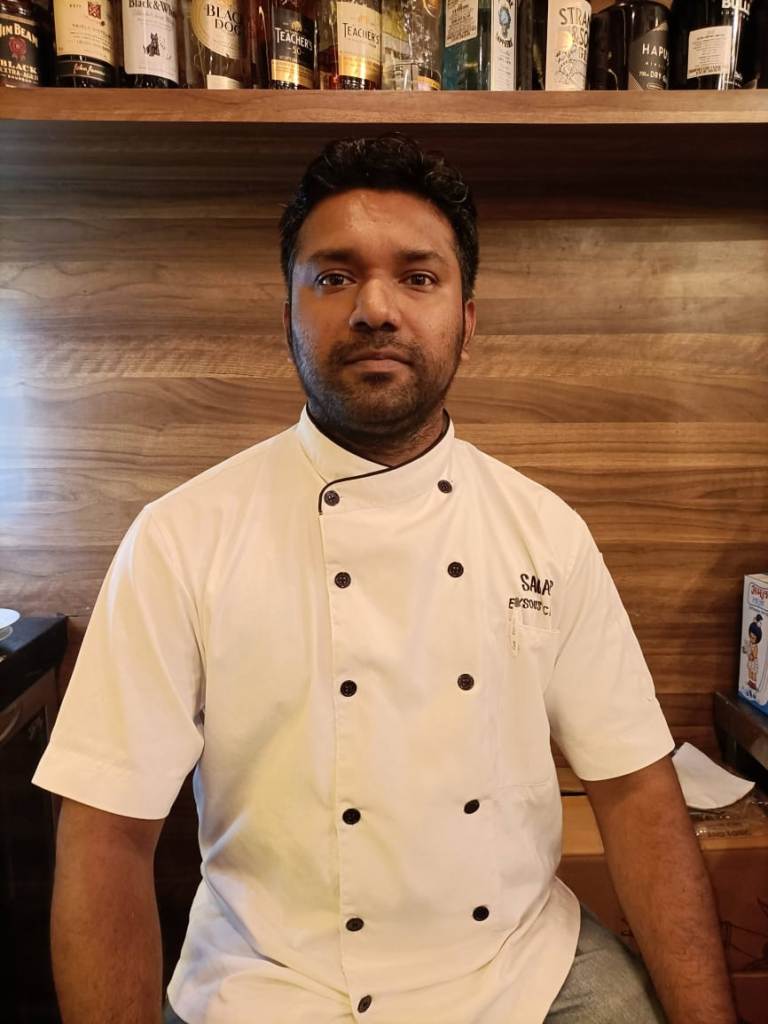
Chef Sunil Singh
Blue Bop
Food systems are rapidly changing, bringing greater attention to issues of food safety. Growing international connectivity of food markets involves the lengthening of supply chains and a proliferation of actors involved in bringing food from the farm to the consumer. Consequently, the detection and elimination of foodborne risks is becoming both more complex and more difficult.
It is increasingly recognized that food safety is a significant threat not only to public health but also to income, trade and nutrition. The broad impacts of foodborne hazards argue for integrated solutions across the entire food system. While no consumer deliberately eats unsafe food, except in extreme situations of famine, millions of people unknowingly challenge their nutrition and health every day by eating food that carries serious risks. Detecting the presence of the agents that make food unsafe is not straightforward. Harmful bacteria, viruses, natural toxins, and chemicals may be present as chemical residues or carried in the matrix of food itself but invisible to the naked eye. Food safety policy, regulation, surveillance are therefore fundamental challenges for governments which seek to enhance the dietary quality and nutrition of their citizens.
Chef Jawairia Merchant
Thai Naam
We are celebrating the fifth annual world food safety day 2023
we must understand how various global factors are affecting the food supply and food safety and how safety must be prioritized as the agrifood system changes with time.
we must aim to help the country to transform agrifood systems so that it will benefit people and the planet and encourages policy maker and stakeholder to increase sustainable, safe food production
FOLLOW THIS SIMPLE 4 RULE KEEP CLEAN
SEPARATE RAW AND COOKED COOK THOROUGHLY
KEEP FOOD AT SAFE TEMPERATURES AND USE SAFE WATER AND RAW MATERIALS
There is no food security without food safety.
Food standards help us to ensure what we eat is safe and that’s why we say safer food and better health.
As a way of raising food safety awareness and promoting food standards we can save many lives from contaminated food illness.

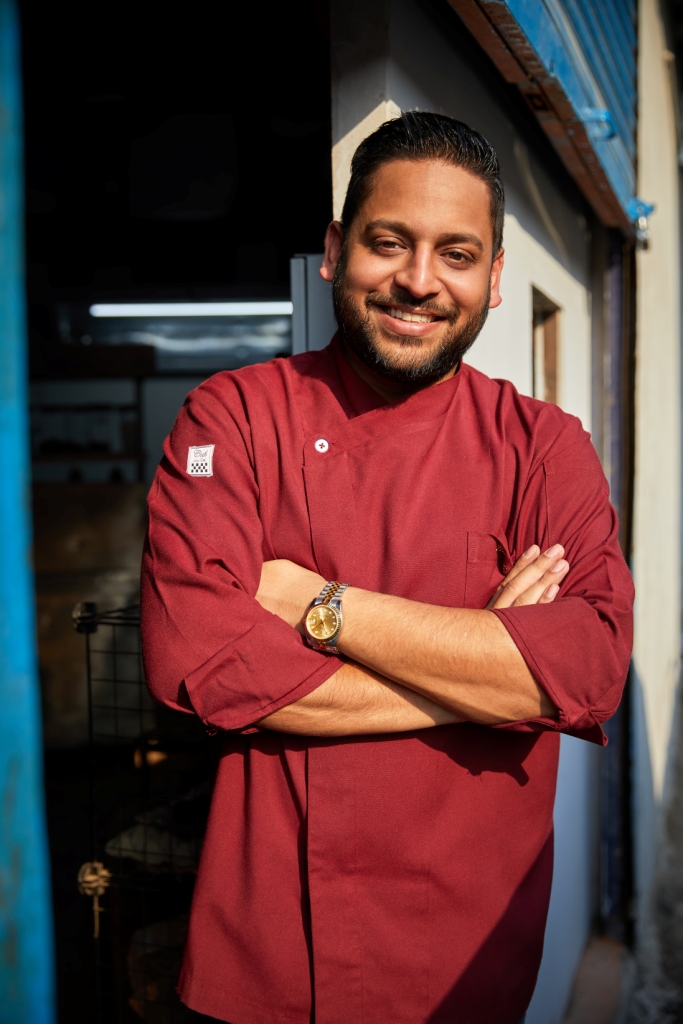
Harsh Garg
Boomburger
All too often do we hear about a mild case of food poisoning affecting the people around us, but what we don’t usually hear about are the hundreds of thousands of people who die each year from eating contaminated food. As the World Health Organization rightly says, “Nobody should die from eating food.”
When we look at the problem as chefs and business owners, it seems like common sense that we should constantly obsess over the quality of the food we serve because good food equals loyal customers which bring in higher profits. So our philosophy at Boomburger is very simple. We only serve food that we would happily eat ourselves and serve to our loved ones.
Food standards, themselves, play a crucial role in ensuring the safety and well-being of consumers. With their comprehensive guidelines and regulations, they form the backbone of a secure and healthy food system. There are four major contributions that come from having good food standards: the prevention of foodborne illnesses, protection against chemical hazards, allergen management, and promoting authenticity and transparency within the food industry.
Food standards serve as the cornerstone of food safety, playing a vital role in saving lives. Every foodborne illness related death is preventable, and we should all be striving to ensure that a basic human right is not killing people.
ANAND JAIN
Co-Founder, Nothing Before Coffee (NBC)
Nourishing Safety: Nothing Before Coffee’s Commitment to World Food Safety Day
In the vibrant world of flavours and aromas, stands a paradise of taste created by our brand “Nothing Before Coffee.” As World Food Safety Day approaches, we aim to shines a light on our constant dedication to providing safe and wholesome delights to our cherished customers.
We understand that every sip and bite carry a responsibility—a responsibility to prioritize the health and well-being of our customers.
Our dedicated team of skilled baristas and chefs undergo rigorous training, equipping them with the knowledge and expertise to handle ingredients and equipment with utmost care. Every step, from food storage to preparation, is performed with meticulous attention to detail, safeguarding the integrity of every food & beverages.
From sourcing ingredients to food preparation, we diligently follow FSSAI’s guidelines at every step of our culinary journey. We partner with trusted suppliers who share our commitment to quality and safety, ensuring that only the freshest and safest ingredients make their way into our foods and beverages.
We are more than just a coffee shop; we’re a beacon of trust. On World Food Safety Day, we proudly stand, ensuring that every customer can savor our beverages with absolute confidence, knowing that their health and well-being are cherished above all.
Let us raise our cups in celebration, acknowledging our unwavering commitment to food safety, and inspiring a world where every meal is a safe and joyful experience.


Chef Ankur Sharma
Raahi Neo Bar and Kitchen, Bangalore
Every year on June 7, people all around the world observe World Food Safety Day to encourage measures that maintain food safety at all levels and to increase awareness of the significance of safe food.
Food safety is crucial for maintaining the general welfare because it is a basic human need. Foodborne infections affect millions of people annually, resulting in severe pain and occasionally fatalities. However, we have the ability to save lives and protect people’s health all across the world by putting strong food standards into place. This year’s World Food Safety Day’s subject, “Food Standards Save Lives,” emphasises the critical function that food standards provide in protecting human health and preventing foodborne illnesses
KEY PRINCIPLES AND PRACTICES OF FOOD SAFETY:
Personal Hygiene: Maintaining good personal hygiene is essential for food workers to stop the spread of pathogenic bacteria. This involves routinely washing your hands, dressing in clean clothes and safety gear, and keeping yourself clean.
HACCP is a systematic method to food safety that detects and manages possible hazards throughout the food production process. In order to prevent, get rid of, or bring hazards down to acceptable levels, it entails analysing and monitoring crucial control points.
Food should be stored properly and temperatures should be kept under control to stop the growth of germs and other infections. It includes keeping food at the proper temperature while being stored, separating cooked from uncooked food, and preventing cross-contamination.
Foodborne illness prevention: Each year, millions of people around the world suffer from foodborne illnesses, which significantly increase morbidity and mortality. Following food standards decreases the possibility of contamination with hazardous bacteria, viruses, parasites, or chemicals, reducing foodborne illnesses and safeguarding the general public’s health.
Food labelling and allergen management: Correct food labelling is vital to educate customers about potential allergens and to supply pertinent details about the product’s ingredients and handling. People with food allergies or intolerances may make educated decisions and stay away from products that could lead to negative responses thanks to clear labelling
In our collaborative endeavour to assure the safety and quality of the food we eat, food standards are a crucial instrument. We recognise the critical function that these standards serve in preserving the general public’s health by adopting the subject “Food Standards Save Lives” for this year’s World Food Safety Day. Strong food standards must be followed in order to prevent.
.
Magique
We take food safety very seriously. There are a few practices we follow in our kitchen at Magique diligently, the process starts right from sourcing the raw ingredients (best quality produce only), and we thoroughly wash our produce with diluted chlorine and refrigerated it in our walk-in freezer with colour codes so that we know the shelf life. The food in the kitchen is cooked at particular temperatures to keep the food fresh and tasty without compromising on quality. Frequent sanitisation and cleaning of common surfaces and kitchen equipment is also a norm. We try to steer clear of sauces and preparations high in sodium and foods high in preservatives by the procurement of fresh ingredients and vegetables.
Small but impactful initiatives such as using seasonal products are encouraged. This allows us to be more creative with our cooking as well. Appropriate training at regular intervals is provided to the kitchen staff about food hygiene among many other food safety topics.
The new age practices at Magique would be considered as frequent sanitisation of common surfaces along with modern UV sanitisation machines we have. The food when served is tried to keep as contactless as possible from the wok to the server to the final customer.

 English
English French
French German
German Italian
Italian




